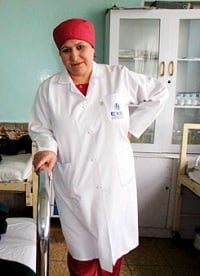
Despite the fact that she grew up in a war-torn country, Dr Hamrah managed to become a doctor. During the conflict she moved to several countries like Tadzhikistan and Ukraine and couldn't work as a doctor for ten years.
In 2002, she returned to Afghanistan and started to work as a gynecologist at Khair Khana hospital in Kabul. Five years later she moved to Malalai Maternity Hospital to work in the newly established Fistula Ward, the only facility in the country to treat obstetric fistula cases."I decided to work in the Fistula Ward because I think these women are really in need of healthcare due to the social stigmatization they suffer in Afghan society. Obstetric fistula takes their dignity away and isolates them from society", says Dr Hamrah.
In Afghanistan, approximately four in every 1,000 women live with an obstetric fistula, a hole between the vagina and bladder or rectum, usually caused by prolonged labour without intervention. Obstetric fistula occurs also in the context of early marriage, when girls are not physically ready to bear a child. "Because women are not familiar with fistula, they think God punishes them for something that they did wrong", explains Dr Hamrah.
Fistula leaves women leaking urine, faeces, or both, and typically results in social isolation and depression. Most of the Afghan women in this condition get divorced and are sent back to their parents' house. According to Hamrah, some of her operations last a whole day. "And the operations are not easy: They require a lot of precision and patience. But I love my job. Helping these women gives me a sense of satisfaction", says Hamrah proudly.
Once she started working in the Ward, she got several trainings from national and international surgeons. "For me this was like a dream come true. Now I can perform all kinds of gynecological surgeries. In some cases I'm the only doctor in Afghanistan with this skill."
Currently, Malalai Maternity Hospital is the only health facility in the country to train surgeons and to treat obstetric fistula in its UNFPA-supported Fistula Ward. The facility treats cases with a 95 percent success rate and it has treated more than 930 fistula survivors.
On the 2015 celebration of the International Obstetric Fistula Day the Minister of Public Health announced the expansion of fistula care to the provinces of Afghanistan by 2019, an initiative, with the support of UNFPA, that will make a difference in the lives of these women.

